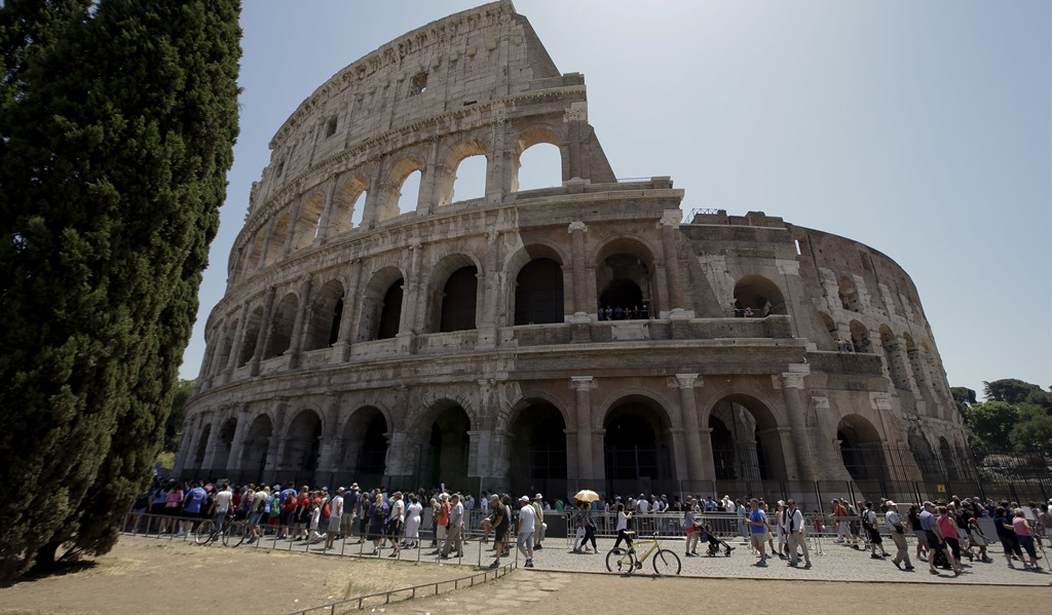It may not seem like it at times, but we're living in a fabulous "Golden Age" in human history.
For most of history, ordinary people lived on the margins, struggling for food, dying of diseases we've conquered, unable to read and better themselves, and subjugated by cruel tyrants.
It's only in the last 250 years that the tide of human freedom began to turn.
We've conquered diseases that killed millions of people in previous ages. Our technology would seem like magic to people from 100 years ago. We can communicate with anyone anywhere in the world in an instant.
Western civilization only saw prosperity like this twice before: once in ancient Rome and again during the Renaissance. But people in those ages only solved some of the problems associated with disease, poverty, and hunger. In America and the industrialized West, we've been able to create conditions that would seem magical to humans from 400 years ago.
Perhaps no civilization in the ancient world was greater than Rome. Unlike other conquerors, Rome gave the conquered people the opportunity to thrive, become Roman citizens, and even ascend to the throne.
"They gave people among the subjected the ability to have a second career in Rome," historian Johan Norberg told John Stossel, writing at Reason.com. Norberg is the author of the new book Peak Human.
"They made them citizens and allowed them to do business, to have a career in the military. Some of the subjected people could even end up being emperors!"
"The son of a freed slave eventually ended up on the throne of Rome. That tells you something about the power of meritocracy and of openness. You'll get the best brains if you're open to more people," Norberg said.
Rome became a great empire not just because of their superior military. True, their weapons and tactics overmatched the far less organized barbarians they were fighting. But Rome had a secret weapon that allowed it to dominate the world until the fall of Constantinople in 1453, more than 1,400 years.
"Tolerance was a weapon, often literally a weapon," Norberg explains. "They got their swords from the Spaniards, ships from Carthage, new business models from other groups. Because Rome was such a huge integrated free trade area, you could source the best material, the best technology from any part of the empire. Therefore, they could become the masters of the world."
So what happened?
Norberg says Rome collapsed because of: "bread and circuses. The emperors wanted to become popular by handing out free stuff to people. Originally, this started small. You just handed the very poor means of subsistence. But it was popular, so the group that lived on the public's expense grew larger all the time. Emperors complained about this. Everyone from Caesar and onwards said, 'We've got to reform this system because it means that we have fewer people working and more people consuming.' But no one succeeded."
It reminds me of the unsustainable promises we see today: Social Security and Medicare in the U.S., absurd retirement promises in other countries—welfare plans going broke.
"Once you have an ever-expanding system of entitlements that you can't afford," says Norberg, "that's often the beginning of the decline and fall.…Romans could conquer the world, but they couldn't do entitlement reform."
Instead, Roman emperors did what modern governments do: printed more money.
Roman coins were minted using less and less gold and silver, devaluing the currency and causing ruinous inflation.
"Inflation was much worse than barbarian invaders," says Norberg. "The emperor blamed greedy businessmen—something that we hear today. He imposed price controls on 1,000 goods. But obviously, it all failed. Prices kept rising and undermined the Roman Empire completely."
Is this America's fate as well?
I've been harping about reforming entitlements for 20 years. It's a no-brainer, of course. Unless we get entitlement spending under control, it's all over for the United States.
The series of events that overtook the Western Roman Empire in the 450s was driven by economic misery.
"We have a backlash against things that keep our society innovative, like trade, migration, unsustainable debts….But that doesn't mean that we're doomed.…It's not automatic, this decline and fall phase," claims Norberg.
"You can unleash new waves of innovation and progress. There is still time. We can still save this golden age."
We can save it as long as there are people in Congress willing to make the hard choices and take huge political risks. Only Congress can reform entitlements. Will the people let them, or will the prospect of reducing Social Security and Medicare benefits drive people into the arms of politicians who promise them the moon and the stars?
I don't see this "Golden Age" lasting much longer. People have never voluntarily given up what was promised to them. The Romans didn't.
Will Americans?










